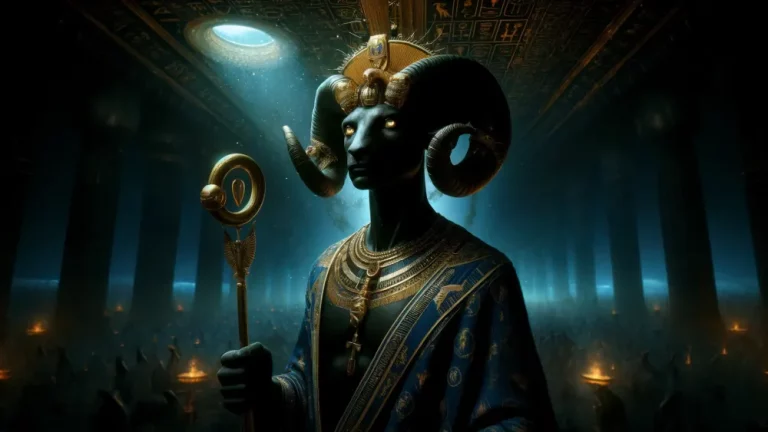Echo: The Greek Nymph Cursed To Repeat Others’ Words
Welcome, we’re taking a look at Echo, one of those really interesting characters from Greek mythology that people have been curious about for a long time, whether they are scholars, artists, or just mythology fans. Echo, who people know for her looks and her enchanting voice, has a special spot in stories from ancient Greece.
Key Points:
- Echo was an Oread nymph, tied to mountains and nature.
- Hera cursed Echo to repeat the last words others said.
- Echo loved Narcissus, who did not love her back.
- Echo’s voice still echoes in nature today.
- Her story means themes like talking, loss, and unreturned love.
- Echo’s tale is in Ovid’s Metamorphoses.
- Echo’s myth stayed important in modern culture.
Her story, which mostly appears in Ovid’s book “Metamorphoses”, comes in different versions, and it’s mostly about things like love, losing stuff, and big changes. A big part of the story is the curse Hera put on her, making Echo only able to say what others say first, which sounds pretty sad. This story means something deep about how ancient Greeks thought about talking and having control over oneself.
As we get into Echo’s story, we will see the different layers of symbolism and what her story means, not only looking at old beliefs that affected her life but also checking how her story keeps coming up, showing up in books, art, and modern culture.
Come and see how Echo’s story has stuck around and why she matters so much in the big picture of Greek myths.
Echo: Overview and Key Facts
| Key Aspect | Description |
|---|---|
| Identity | Echo is a nymph, a type called an Oread, who is linked to mountains and nature in Greek myths. Her nature highlights her beauty and her bond with wild places. |
| Mythological Origin | It’s in “Metamorphoses” by the Roman poet Ovid that her story is most well known. Though in Greek oral stories, her tale changes, showing strong cultural ties. |
| Attributes | For her captivating voice, Echo is a symbol of music and speaking. Her voice is so important that it defines her and changes everything in her story. |
| Curse by Hera | Because of something to do with Zeus, Hera put a curse on Echo so she could only say what others said. This curse silenced her own voice, meaning powerlessness and being unable to express herself. |
| Connection to Narcissus | Because she fell in love with Narcissus, who did not love her back, Echo’s story includes her sorrow and change into just a voice, meaning something about wanting what you can’t have. |
| Legacy | Over time, Echo became what people think of when they hear an echo in nature. Her myth inspired lots of art and stories, meaning her influence stays in culture. |
| Symbolism | Her story talks about losing and feeling alone, and what happens when people deceive, fitting into old Greek ideas about talking and what men and women should be. |
The Story of Echo in Greek Tales
When you dig into Echo’s stories, we find complex stories about her life and about how she met gods and people, which explains the lasting effect of her tale. To find out about her, we look at her stories to know who she was and what her story means.
Who Exactly Was Echo?
Echo is known in Greek mythology as an Oread; she was a mountain nymph, with charming looks and a musical voice, which gave her a presence in the natural spaces she lived in. As a nymph, she was part of a group of smaller gods tied to certain natural features, meaning the Greeks really valued nature. She played an essential part in stories where her life got mixed up with the main gods of Olympus. Here are some parts of Echo’s identity, which mean her importance in culture:

- Nymphal Attributes: Echo and other nymphs were often seen as signs of life and nature, with Echo being like calm, untouched land.
- Association with Music and Voice: Her nice voice was both a talent and part of what made her special. It made her a sign of great sounds and speech, and showed nature’s harmony.
- Mythological Relations: She interacted with gods, mostly Zeus and Hera, showing her role in the divine stories. This made her part of tales about lying and getting payback.
Echo shows the mix of divine influence and nature. She stands for traits seen in art and culture over time.
Echo, a mountain nymph from Greek mythology, symbolizes the blend of nature and divine influence with her musical voice, life tied to nature, and interactions with main gods Zeus and Hera in tales of deceit and retribution.
How Hera’s Curse Took Echo’s Voice
Echo’s story about Hera’s curse is a deep example of the way divine politics and personal problems are common in Greek mythology. In the middle of things, Echo was caught in a hidden plan related to Zeus. Zeus, who often had many love affairs, used Echo to distract his wife, Hera, with her charming talk while he followed his romantic interests.
But Hera, known for her jealousy and watchfulness, eventually found out about what Echo did for Zeus. She got angry and wanted to punish Echo for being part of Zeus’s lie, so she made Echo lose the ability to speak her own words and only let her say the last words others said.
This basically silenced her and it took away her most important gift, her voice, leaving her to be just like a repeat of those around her. Because of what Hera did, Echo’s life changed a lot. Before, she could talk and express herself, but was now limited to just repeating, which means a loss of self and expression.
In Greek times, where speaking well was very important, this punishment made her almost disappear, she became just a reflection of what others said. This big change is like being socially shunned or like copying without any say, where a person can only say back what they hear without giving their own ideas.
Echo being silenced not only means the seriousness of getting back at someone by the gods, it also brings up ideas of having no power and being alone, which are still meaningful today. It makes us think seriously about how important having our voice is to who we are and having control in the world.
Echo’s Heartbreak Over Narcissus
The sad story of Echo’s unrequited love for Narcissus is about the meaning of wanting and not getting back. In the book “Metamorphoses” by Ovid, Echo sees Narcissus, a very beautiful young man, while she walks in the forest. She feels a strong liking for him right away, but her curse will not let her talk to him, and so she stays quiet.
To communicate her affection, all she can do is repeat his words, which means her longing and that she is vulnerable. When she sees Narcissus, Echo feels a strong liking, similar to what modern readers may think of as a silent crush – where the person you like doesn’t know how much you feel for them.
She tries to talk to him, and yet he does not notice, which really points out how cruel things are for her because she cannot explain her feelings as she wants to. Famous for his vanity, Narcissus does not return Echo’s liking because he is focused on his own reflection. He pushes her away, showing self-absorption, which is key to his myth.
His focus on himself is the opposite of Echo’s problem – she wants to connect, but gets silence and refusal. This story has remained important as a strong tale about the hard truth of unrequited love, like how today one might speak from the heart but hear nothing in return.
For Echo, there is no happy ending, no comfort; she is left with sadness, which is familiar to anyone who has loved without being loved back. Echo’s deep sadness after her meeting with Narcissus signals a big change, as she becomes more alone. In her heartbreak, she stops appearing, and you can only hear her voice left, as if always mourning her love.

This change from a clear being to a fleeting presence means her full joining with nature – a sad sign of the marks left by love and refusal. Her voice, which keeps going, stands for the never-ending pain of wanting without success and the unavoidable nature of her loss, acting as a long-lasting reminder of the heart’s drive.
This story calls for reflection on the pain of lost love, and how it can change who you are, themes anyone can relate to at any time.
Echo’s Change and Her Lasting Echo
Becoming just a sound is Echo’s change, an eerie part of her story, meaning her sad tale stays forever in nature. Because of Narcissus and how it hurt her, Echo gets so sad that her body just goes away, leaving only her voice, which is still there and echoing strongly.
When Echo loses her body, it means losing her physical side, but keeping what lasts, a thing seen a lot in myths where people change to keep their connection to the world differently.
Echo, now without her form, is felt in the echoes that fill the valleys and hills, and it hits the rocks and trees, keeping her around even though her body isn’t there, her voice continues to share her plight with everyone.
The way Echo is always part of the world highlights a strong idea in her story: that voices, and even stories, go beyond limits of the body, making a legend that talks across time. Her change from solid to sound means moving from physical touch to a spiritual influence people can feel all around.
People from ancient Greece thought echoes were magical happenings, which made them think about spirits and how they mix with life and higher beings. Echo, like this, becomes a lasting symbol of keeping feelings alive, and it makes us think about how, even when bodies end or fade, emotional and cultural marks can keep going.
This story helps us think about how voices, whether spoken or silent echoes, still shape the landscapes of human history and what people go through.
What Echo’s Story Means and the Big Ideas
Echo’s story, with its mix of ideas and things, makes us look into the big lessons and how people think. Her story means a way to see timeless concepts like voice, identity, and the human condition. Through this, we get to understand more about these topics.
The Meaning Behind Her Voice and Quiet
Echo’s story of voice and forced quiet means a deep message on communication and isolation. Her voice is stuck in repeating, which means the loss of self and being pushed aside – a clear picture of how outside forces stop personal talk. This ties to modern life where people might feel unheard or forced to repeat common ideas and not add their own thoughts.
Her voice really means a big talk about freedom and trying for self-talk in life’s settings.
Because she cannot fully talk, Echo is alone, so she is just reflection and quiet sound. When Echo cannot talk, her myth means humans often want real connections, a common idea seen everywhere. Her never-spoken presence gets us thinking about expressing oneself and looking for identity. The ideas behind her silence are:
- Isolation: Her quiet being shows how her curse makes her alone.
- Reflection: It means looking inside and taking in her life.
- Perseverance: Echo’s voice stays there, meaning one’s self continues, even when things are tough.
What Echo’s Story Says About Old Greek Views
Echo’s story shows old Greek views on voice and freedom, focusing on limitations on voice and women’s roles in society. In Greek myths, figures like Echo mean what happens when you go against rules or gods, showing a mix in culture between being quiet and speaking up.
It shows how her story, where Echo can only repeat sounds, means a wider view on how women’s speech was seen, and it looks at a tight system that held back women’s choices. It’s like past times when women had to be quiet, matching the quiet problems Echo has. And when Echo changes to only her voice, it shows a Greek interest in changes and mixing identity with change in their stories.
This strong old story gives a look into what was valuable and normal in old Greece, and it gives a look at how these people dealt with concepts of identity and silence.
Echo’s tale highlights ancient Greek thoughts on voice and women’s roles, showing how her story of only repeating sounds reflects the limited choices and speech women had in that society.
Lessons from Echo’s Sad Romance
Echo’s one-sided love story with Narcissus has lots of strong lessons about love’s way and the feelings when giving does not get a return. She points to the hurt that happens when you want someone who is in love with themselves too much to care back. This is common and happens always; it is like meeting today’s problems of unreturned affections, where one person gives and the other, they just do not notice or care. Echo’s problem not only shows personal pain but also means the need for self-awareness and emotional limits. The big lessons from Echo’s romance include:

- The Pain of Unrequited Love: Feeling sad from loving someone who does not love back.
- Self-Sacrifice and Devotion: The risk of losing yourself while giving too much to someone else.
- The Need for Self-Reflection: Knowing it is important to understand your own feelings to avoid chasing what you cannot have.
Echo’s Impact Over the Years
In Echo’s story, lasting ideas struck a chord through the years, making many different understandings and changes in different times. It means that, in art from old times and in new culture things, Echo still makes people interested.
Echo in Old Greek Stories and Art
Echo’s interesting story and sad events got remembered in many Greek stories and artworks of old, displaying her important ideas in Greek culture. In the writings, Ovid, who was a Roman poet, talked about Echo in “Metamorphoses”, where her story joins with Narcissus. It shows ideas about love and loss in a nice way.
In the art of ancient times, Echo with Narcissus appears in paintings and vases, showing her looking or changing to a more ghost-like presence. These visual things are similar to how movies today might make a character clear, taking words and creating a picture that people find interesting.

And these old things mean not only Echo’s story is important but also help us get a look at the early society where myths and art went together closely.
How Echo Shows Up Today in Modern Stuff
The myth about Echo has spread through today’s culture in many ways, especially through books and media that look again at her strong story. The way Echo spoke others’ words has, by example, inspired modern artistic expressions that deal with ideas of self, voice, and wanting to connect. In writing, Echo’s ideas are seen again in stories about feeling alone and wanting something.
Individuals who face problems of copying others’ lives are common in novels and films, taking Echo’s old problem to shine a light on the questions of self and truth. This story can be like societal challenges now of finding your voice among all the outside noise, much like Echo’s small speech. And Echo appears not just in books but in different media like music and on the internet.
While in music, ‘echo’ is literal, like sound, and also stands for repeating and bouncing back that makes people feel. Modern artists mention her story to deepen ideas of unreturned love and wanting. Beyond these, Echo’s name is seen in tech like digital voice assistants that say back things asked – really showing her curse – marking her long-lasting role where voice, people, and technology meet today.
This continuous talk about Echo means her story, though old, stays important and real in our current thinking.
Other Echo-Like Stories Around the World
An idea about someone who cannot speak freely, who must say what someone else says, appears all over in many cultures. It means shared worries about how we talk and who we are. In stories from Native Americans, a legend tells of the Echo Woman, who can speak by repeating others only, like the Greek nymph.
It means loss and longing, showing what happens when people are not heard or aren’t understood. And in Scandinavian folklore, there are tales about forest spirits that copy human voices, a natural force meeting quietly yet fully with the human world, much like Echo who meets those in Greek stories.
And in Asia, stories with talking limits show up, like in Chinese ghost tales where spirits talk by copying humans. These stories sometimes mean lessons about why voice and plans matter, like Echo’s own story. In Japan, the idea is in yokai tales. Ghosts stay in spots saying lines they hear.
These similar stories show not just the shared human interest in echoes but also how different places used stories to ask big questions about life, talking, and self. Knowing these tales gives a better idea of how deeply these ideas lie in stories people tell on every continent and every time.
Stories from around the world show how different cultures explore themes of expression and identity through tales of beings who can only mimic others, highlighting common worries about voice and self across diverse societies.
Pantheon of Greek Mythology: Creatures and Monsters
The world of Greek mythology is filled with an interesting group of creatures and monsters, making people think with their different shapes and stories. Monsters from stories. Strong. Amazing. From the mighty Minotaur, part man and part bull, to the Hydra with many heads that Hercules had to face, these beings mean both wonders and fears in old Greek thoughts.
These creatures weren’t just things to beat; they often meant something and were strong tests of courage and cleverness in big stories. If you are someone who likes these stories, this Greek Creatures and Monsters list looks at the known figures and shows the rich mix of beings in stories told through the years.
FAQs
1. Who cursed Echo in Greek mythology?
In Greek mythology, Echo was cursed by the goddess Hera.
2. What does Echo symbolize in her myth?
In her myth, Echo symbolizes the consequences of lost autonomy and the enduring presence of unreciprocated love.
3. How is Echo’s story connected to that of Narcissus?
Echo’s story is connected to that of Narcissus through her unrequited love for him, which led to her ultimate despair and transformation into a mere echo.
4. Why is Echo important in Greek mythology?
Echo is important in Greek mythology because her story embodies themes of communication, loss, and unrequited love, illustrating the consequences of divine intervention and human emotion.







